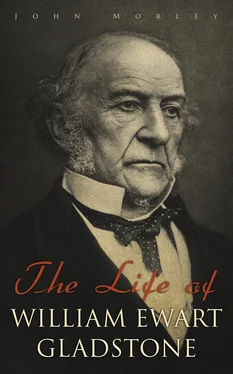Some months passed between leaving Eton and going to Oxford. In January 1828, Gladstone went to reside with Dr. Turner at Wilmslow in Cheshire, and remained there until Turner was made Bishop of Calcutta. The bishop's pupil afterwards testified to his amiability, refinement, and devoutness; but the days of his energy were past, and 'the religious condition of the parish was depressing.' Among the neighbouring families, with whom he made acquaintance while at Wilmslow, were the Gregs of Quarry Bank, a refined and philanthropic household, including among the sons William R. Greg (born in the same year as Mr. Gladstone), that ingenious, urbane, interesting, and independent mind, whose speculations, dissolvent and other, were afterwards to take an effective place in the writings of the time. 'I fear he is a unitarian,' the young churchman mentions to his father, and gives sundry reasons for that sombre apprehension; it was, indeed, only too well founded.
While at Wilmslow (Feb. 5, 1828) Gladstone was taken to dine with the rector of Alderley—'an extremely gentlemanly and said to be a very clever man,'—afterwards to be known as the liberal and enlightened Edward Stanley, Bishop of Norwich, and father of Arthur Stanley, the famous dean. Him, on this occasion, the young Gladstone seems to have seen for the first time. Arthur Stanley was six years his junior, and there was then some idea of sending him to Eton. As it happened, he too was a pupil at Rawson's at Seaforth, and in the summer after the meeting at Alderley the two lads met again. The younger of them has described how he was invited to breakfast with William Gladstone at Seaforth House; in what grand style they breakfasted, how he devoured strawberries, swam the Newfoundland dog in the pond, looked at books and pictures, and talked to W. Gladstone 'almost all the time about all sorts of things. He is so very good-natured, and I like him very much. He talked a great deal about Eton, and said that it was a very good place for those who liked boating and Latin verses. He was very good-natured to us all the time, and lent me books to read when we went away.' 33A few months later, as all the world knows, Stanley, happily for himself and for all of us, went not to Eton but to Rugby, where Arnold had just entered on his bold and noble task of changing the face of education in England.
23. Gleanings , vii. p. 138.
24.A story sometimes told of Provost Goodall.
25.At Marlborough, Feb. 3, 1877; at Mill Hill School, June 11, 1879.
26.Doyle tells a story of the boy being flogged for bringing wine into his study. When questioned on this, Mr. Gladstone said, 'I was flogged, but not for anything connected in any way with wine, of which, by the by, my father supplied me with a small amount, and insisted upon my drinking it, or some of it, all the time that I was at Eton. The reason why I was flogged was this. I was præpostor of the remove on a certain day, and from kindness or good nature was induced to omit from the list of boys against whom H. [the master] had complained, and who ought to have been flogged next day, the names of three offenders. The three boys in question got round me with a story that their friends were coming down from London to see them, and that if they were put down on the flogging list they could not meet their friends. Next day when I went into school H. roared out in a voice of thunder, "Gladstone, put down your own name on the list of boys to be flogged."' Mr. Gladstone on this occasion told another tale of this worthy's 'humour.' 'One day H. called out to the præpostor, “Write down Hamilton's name to be flogged for breaking my window.” “I never broke your window, sir,” exclaimed Hamilton. “Præpostor,” retorted H., “write down Hamilton's name for breaking my window and lying.” “Upon my soul, sir, I did not do it,” ejaculated the boy, with increased emphasis. “Præpostor, write down Hamilton's name for breaking my window, lying, and swearing.” Against this final sentence there was no appeal, and, accordingly, Hamilton was flogged (I believe unjustly) next day.'—F. Lawley in Daily Telegraph , May 20, 1898.
27. Temple Bar , Feb. 1883.
28.Feb. 10, 1827.
29.Mr. Gladstone fixed on two of the elegies of In Memoriam as most directly conveying the image of Arthur Hallam, cviii. and cxxviii.
30. Iliad , iii. 221.
31. Ibid. x. 242.
32.I have heard him tell this story, and Garrick himself could not have reproduced a schoolboy's glee with more admirable accent and gesture.
33.Prothero's Life of Dean Stanley , 1. p. 22.
( October 1828-December 1831 )
Steeped in sentiment as she lies, spreading her gardens to the moonlight, and whispering from her towers the last enchantments of the Middle Age, who will deny that Oxford, by her ineffable charm, keeps ever calling us nearer to the true goal of all of us, to the ideal, to perfection—to beauty, in a word, which is only truth seen from another side?—M. Arnold.
Glorious to most are the days of life in a great school, but it is at college that aspiring talent first enters on its inheritance. Oxford was slowly awakening from a long age of lethargy. Toryism of a stolid clownish type still held the thrones of collegiate power. Yet the eye of an imaginative scholar as he gazed upon the grey walls, reared by piety, munificence, and love of learning in a far-off time, might well discern behind an unattractive screen of academic sloth, the venerable past, not dim and cold, but in its traditions rich, nourishing, and alive. Such an one could see before him present days of honourable emulation and stirring acquisition—fit prelude of a man's part to play in a strenuous future. It is from Gladstone's introduction into this enchanted and inspiring world, that we recognise the beginning of the wonderful course that was to show how great a thing the life of a man may be made.
CHRIST CHURCH
The Eton boy became the Christ Church man, and there began residence, October 10, 1828. Mr. Gladstone's rooms, during most of his undergraduate life, were on the right hand, and on the first floor of the staircase on the right, as one enters by the Canterbury gate. He tells his mother that they are in a very fashionable part of the college, and mentions as a delightful fact, that Gaskell and Seymer have rooms on the same floor. Samuel Smith was head until 1831, when he was succeeded by the more celebrated Dr. Gaisford, always described by Mr. Gladstone as a splendid scholar, but a bad dean. Gaisford's excellent services to the Greek learning of his day are unquestioned, and he had the signal merit of speech, Spartan brevity. For a short time in 1806 he had been tutor to Peel. When Lord Liverpool offered him the Greek professorship, with profuse compliments on his erudition, the learned man replied, 'My Lord, I have received your letter, and accede to the contents.—Yours, T. G.' And to the complaining parent of an undergraduate he wrote, 'Dear Sir,—Such letters as yours are a great annoyance to your obedient servant T. Gaisford.' 34This laconic gift the dean evidently had not time to transmit to all of his flock.
Christ Church in those days was infested with some rowdyism, and in one bear-fight an undergraduate was actually killed. In the chapel the new undergraduate found little satisfaction, for the service was scarcely performed with common decency. There seems, however, to have been no irreconcilable prejudice against reading, and in the schools the college was at the top of its academic fame. The influence of Cyril Jackson, the dean in Peel's time, whose advice to Peel and, other pupils to work like a tiger, and not to be afraid of killing one's self by work, was still operative. 35At the summer examination of 1830, Christ Church won five first classes out of ten. Most commoners, according to a letter of Gaskell's, had from three hundred and fifty to five hundred pounds a year; but gentlemen commoners like Acland and Gaskell had from five to six hundred. At the end of 1829, Mr. Gladstone received a studentship honoris causa , by nomination of the dean—a system that would not be approved in our epoch of competitive examination, but still an advance upon the time-honoured practice of deans and canons disposing of studentships on grounds of private partiality without reference to desert. We may assume that the dean was not indifferent to academic promise when he told Gladstone, very good-naturedly and civilly, that he had determined to offer him his nomination. The student designate wrote a theme, read it out before the chapter, passed a nominal, or even farcical, examination in Homer and Virgil, was elected as matter of course by the chapter, and after chapel on the morning of Christmas eve, having taken several oaths, was formally admitted in the name of the Holy Trinity.
Читать дальше









![William Frith - John Leech, His Life and Work. Vol. 1 [of 2]](/books/747171/william-frith-john-leech-his-life-and-work-vol-thumb.webp)


![William Frith - John Leech, His Life and Work, Vol. 2 [of 2]](/books/748201/william-frith-john-leech-his-life-and-work-vol-thumb.webp)